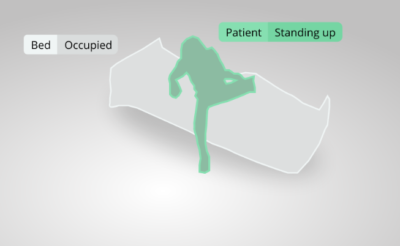Hands-free phone calls and touchless soap dispensers have been the norm for years. Next up, contact-free hospitals.
San Francisco-based startup Ouva has created a hospital intelligence platform that monitors patient safety, acts as a patient assistant and provides a sensory experience in waiting areas — without the need for anyone to touch anything.
The platform uses the NVIDIA Clara Guardian application framework so its optical sensors can take in, analyze and provide healthcare professionals with useful information, like whether a patient with high fall-risk is out of bed. The platform is optimized on NVIDIA GPUs and its edge deployments use the NVIDIA Jetson TX1 module.
Ouva is a member of NVIDIA Inception, a program that provides AI startups go-to-market support, expertise and technology. Inception partners also have access to NVIDIA’s technical team.
Dogan Demir, founder and CEO of Ouva, said, “The Inception program informs us of hardware capabilities that we didn’t even know about, which really speeds up our work.”
Patient Care Automation
The Ouva platform automates patient monitoring, which is critical during the pandemic.
“To prevent the spread of COVID-19, we need to minimize contact between staff and patients,” said Demir. “With our solution, you don’t need to be in the same room as a patient to make sure that they’re okay.”
More and more hospitals use video monitoring to ensure patient safety, he said, but without intelligent video analytics, this can entail a single nurse trying to keep an eye on up to 100 video feeds at once to catch an issue in a patient’s room.
By detecting changes in patient movement and alerting workers of them in real time, the Ouva platform allows nurses to pay attention to the right patient at the right time.

“The platform minimizes the time that nurses may be in the dark about how a patient is doing,” said Demir. “This in turn reduces the need for patients to be transferred to the ICU due to situations that could’ve been prevented, like a fall or brain injury digression due to a seizure.”
According to Ouva’s research, the average hospitalization cost for a fall injury is $35,000, with an additional $43,000 estimated per person with a pressure injury like an ulcer from the hospital bed. This means that by preventing falls and monitoring a patient’s position changes, Ouva could help save $4 million per year for a 100-bed facility.
Ouva’s system also performs personal protective equipment checks and skin temperature screenings, as well as flags contaminated areas for cleaning, which can reduce a nurse’s hours and contact with patients.
Radboud University Medical Center in the Netherlands recently integrated Ouva’s platform for 10 of its neurology wards.
“Similar solutions typically require contact with the patient’s body, which creates an infection and maintenance risk,” said Dr. Harry van Goor from the facility. “The Ouva solution centrally monitors patient safety, room hygiene and bed turnover in real time while preserving patients’ privacy.”
Patient Assistant and Sensory Experience
The platform can also guide patients through a complex hospital facility by providing answers to voice-activated questions about building directions. Medical City Hospital in Dallas was the first to pick up this voice assistant solution for their Heart and Spine facilities at the start of COVID-19.
In waiting areas, patients can participate in Ouva’s touch-free sensory experience by gesturing at 60-foot video screens that wrap around walls, featuring images of gardens, beaches and other interactive locations.
The goal of the sensory experience, made possible by NVIDIA GPUs, is to reduce waiting room anxiety and improve patient health outcomes, according to Demir.
“The amount of pain that a patient feels during treatment can be based on their perception of the care environment,” said Demir. “We work with physical and occupational therapists to design interactive gestures that allow people to move their bodies in ways that both improve their health and their perception of the hospital environment.”
Watch Ouva’s sensory experience in action:
Stay up to date with the latest healthcare news from NVIDIA and check out our COVID-19 research hub.
The post Startup’s AI Platform Allows Contact-Free Hospital Interactions appeared first on The Official NVIDIA Blog.
